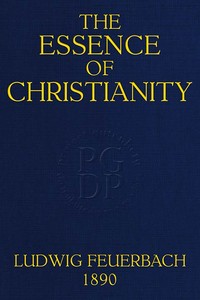The Essence of Christianity by Ludwig Feuerbach
"The Essence of Christianity" by Ludwig Feuerbach is a philosophical treatise written in the mid-19th century. This work examines the nature of Christianity, arguing that it ultimately reflects human nature and consciousness rather than a divine framework. Feuerbach's central thesis posits that the concepts of God and religion arise from the inner workings of humanity, emphasizing that religion is a projection of human attributes and experiences onto the divine. The opening of
the text sets the foundation for Feuerbach's analysis, where he discusses the essential nature of man and religion. He argues that religion is rooted in human consciousness and that the divine attributes attributed to God are reflective of human qualities. Feuerbach critiques traditional theological perspectives by stating that the relationship between man and God is fundamentally a relationship with one's own nature. He introduces the idea that as humanity evolves and understands its nature, the need for an anthropomorphic understanding of God diminishes, leading to a more profound self-awareness and self-acceptance. This perspective poses significant implications for philosophical and theological discourse, marking a shift towards human-centered thought in contrast to divinely oriented beliefs. (This is an automatically generated summary.)
Read or download for free
| How to read | Url | Size | |||
|---|---|---|---|---|---|
| Read now! | https://www.gutenberg.org/ebooks/47025.html.images | 1.1 MB | |||
| EPUB3 (E-readers incl. Send-to-Kindle) | https://www.gutenberg.org/ebooks/47025.epub3.images | 465 kB | |||
| EPUB (older E-readers) | https://www.gutenberg.org/ebooks/47025.epub.images | 509 kB | |||
| EPUB (no images, older E-readers) | https://www.gutenberg.org/ebooks/47025.epub.noimages | 495 kB | |||
| Kindle | https://www.gutenberg.org/ebooks/47025.kf8.images | 785 kB | |||
| older Kindles | https://www.gutenberg.org/ebooks/47025.kindle.images | 663 kB | |||
| Plain Text UTF-8 | https://www.gutenberg.org/ebooks/47025.txt.utf-8 | 890 kB | |||
| Download HTML (zip) | https://www.gutenberg.org/cache/epub/47025/pg47025-h.zip | 425 kB | |||
| There may be more files related to this item. | |||||
About this eBook
| Author | Feuerbach, Ludwig, 1804-1872 |
|---|---|
| Translator | Eliot, George, 1819-1880 |
| Uniform Title | Das Wesen des Christenthums. English |
| Title |
The Essence of Christianity Translated from the second German edition |
| Note | Wikipedia page about this book: en.wikipedia.org/wiki/The_Essence_of_Christianity |
| Credits |
Produced by Jeroen Hellingman and the Online Distributed Proofreading Team at www.pgdp.net/ for Project Gutenberg (This file was produced from images generously made available by The Internet Archive/American Libraries.) |
| Reading Level | Reading ease score: 56.9 (10th to 12th grade). Somewhat difficult to read. |
| Language | English |
| LoC Class | B: Philosophy, Psychology, Religion |
| Subject | Christianity -- Controversial literature |
| Subject | Religion -- Philosophy |
| Category | Text |
| EBook-No. | 47025 |
| Release Date | Oct 2, 2014 |
| Most Recently Updated | Oct 24, 2024 |
| Copyright Status | Public domain in the USA. |
| Downloads | 1221 downloads in the last 30 days. |
| Project Gutenberg eBooks are always free! | |

